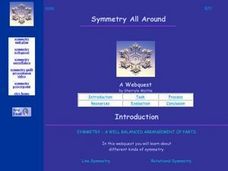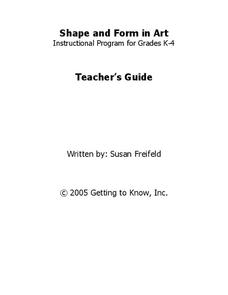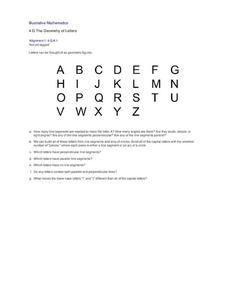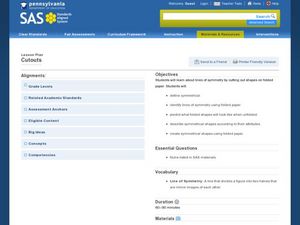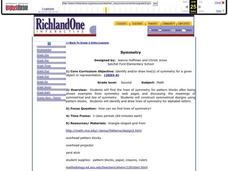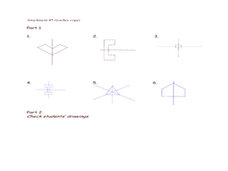Curated OER
Radial Balance Geometric Shapes
Fifth graders create a radially balanced design using geometric shapes which exhibits their prior knowledge of symmetry. They use a kaleidoscope image to develop a design using markers or colored pencils.
Curated OER
Countdown Challenge Symmetry
In this symmetry worksheet, students identify the lines of symmetry in given polygons. They match the number of lines of symmetry to the correct figure. This one-page worksheet contains seven problems.
Curated OER
Symmetry Fun
In this symmetry learning exercise, 7th graders identify and complete 12 different lines of symmetry in polygons. First, they color all of the polygons that have a line of symmetry. Then, students circle all of the regular polygons and...
Curated OER
Flipping Butterflies: Triadic Colors and Symmetry
Second graders create symmetrical butterfly wings. For this symmetry lesson, 2nd graders observe butterfly wings and create their own. They make both sides symmetrical and mix primary colors to make secondary colors.
Curated OER
Symmetry All Around
Learners explore geometry by creating a quilt square. For this symmetry lesson, students identify a list of items, designs, insects and animals which have either rotational or line symmetry. Learners investigate symmetrical designs on...
Noyce Foundation
The Shape of Things
Investigate the attributes of polygons. A thorough set of lessons presents problem scenarios for elementary through high school classes. The first lessons focus on basic characteristics of polygons, including the line of symmetry. As the...
Getting to Know
Shape and Form in Art
Introduce youngsters to the important role shape and form play in art with this extensive collection of activities and projects. From teaching first graders how to create mandalas to engaging third and fourth graders in the design of...
Illustrative Mathematics
The Geometry of Letters
Use the alphabet as a tool for teaching your class about geometric figures. Break apart capital letters into line segments and arcs. Classify angles as right, acute, or obtuse. Identify parallel and perpendicular lines. An excellent...
Curated OER
Cutouts
Students identify symmetry in shapes. For this geometry lesson, students fold paper to identify lines of symmetry. Students create various symmetrical shapes using folded paper.
Curated OER
Symmetry
Second graders find the lines of symmetry in pattern blocks and alphabet letters. In this symmetry lesson, 2nd graders discuss what symmetry is, view examples of lines of symmetry and apply what they have learned by finding the line of...
Curated OER
Shaping the View: Symmetry and Balance
High schoolers view an image from the Metropolitan Museum of Art and identify the focal point of the painting. They discuss symmetry and balance as it pertains to the images. Students use the Student LaunchPad (linked to this activity)...
Curated OER
Shaping Up with Nature at Black Bayou Lake
Students visit a local lake refuge and identify shapes they find in nature. They take pictures of the various shapes and use KidPix to draw shapes around the shapes in the pictures. They watch a slideshow of all the shapes found by their...
Curated OER
Symmetrical Geometry Paintings
Here is a clever, cross-curricular lesson that combines art and geometry. Learners design a painting that uses geometrical shapes and is symmetrical. Sponge-shaped geometrical figures are used to design half a page and fold them to...
Curated OER
Reflections of Symmetry
Students use video and the Internet to identify examples of bilateral and radial symmetry in the world around them. They create symmetrical reflection designs using pattern blocks and paper.
Curated OER
Symmetry and Tangrams
Sixth graders build figures out of tangrams. In this symmetry lesson, 6th graders view tangrams and identify the polygons included in them. Students divide into groups, identify their tangram pieces, define the lines of symmetry, and use...
Curated OER
2D and 3D Shapes
In this geometry worksheet, students draw 6 different shapes as requested by 6 specific directives in the circles provided. Students draw 2D and 3D shapes.
Curated OER
Symmetry
Symmetry is a term found in art, math, and science, prep your students to encounter symmetry from any angle. This presentation provides several simple examples of shapes that do and do not have a line of symmetry.
Gatton Park
Magical Maths
A variety of activities take scholars outside the classroom to explore shapes, symmetry, measurement, patterns, sorting, and time in nature. Learners participate individually, and in teams, to measure found objects, go on a scavenger...
Curated OER
A World of Symmetry
Students identify lines of symmetry. In this symmetry instructional activity, students create objects and identify their lines of symmetry. They answer questions about lines of symmetry. Students cut shapes out of cookie dough and...
Curated OER
Simply Symmetry
Students are introduced to the concept of symmetry by examining different shapes and folding them into equal halves. They work in small groups focusing on finding the lines of symmetry of one specific shape. A symmetry booklet is made by...
Curated OER
Symmetry Monsters
Students discuss and study the word symmetry. They examine letters of the alphabet, shapes, and artwork and decide if they are symmetrical or not. Then they create their own symmetry monsters.
Curated OER
Let's Learn about Symmetry
Students explore symmetry in architecture. In this cross curriculum art and architecture lesson plan, students fold paper to illustrate symmetry and identify symmetrical and asymmetrical shapes. Students observe photographs or take a...
Curated OER
Symmetry Self-Assessment
Students draw symmetrical shapes. In this symmetry lesson plan, students complete a self assessment worksheet. Students draw shapes that have lines of symmetry. They then check for rotational symmetry and show the relationship between...
Curated OER
Symmetry, Similar & Congruent Shapes
Fifth graders identify lines of symmetry., similar and congruent shapes. They use construction paper to create their own symmetrical shapes. Students create stained glass frames containing symmetrical, congruent and similar shapes.






